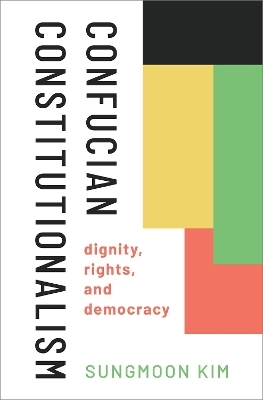
Confucian Constitutionalism
Dignity, Rights, and Democracy
Seiten
2023
Oxford University Press Inc (Verlag)
978-0-19-763061-7 (ISBN)
Oxford University Press Inc (Verlag)
978-0-19-763061-7 (ISBN)
Ongoing debates among political theorists revolve around the question of whether the overarching goal of Confucianism--serving the people's moral and material wellbeing--is attainable in modern day politics without broad democratic participation. One side of the debate, voiced by Confucian meritocrats, argues that only certain people are equipped with the moral character needed to lead and ensure broad public wellbeing. The other side, voiced by Confucian democrats, argues that unless all citizens participate equally in the public sphere, a polity cannot attain the moral growth that Confucianism emphasizes.
Written by one of the leading voices of Confucian political theory, Confucian Constitutionalism presents a constitutional theory of democratic self-government that is normatively appealing and politically practicable in East Asia's historically Confucian societies, which are increasingly pluralist, multicultural, and rights sensitive. While Confucian political theorists are preoccupied with how to build a Confucianism-inspired institution that would make a given polity more meritorious, Sungmoon Kim offers a robust normative theory of Confucian constitutionalism--what he calls "Confucian democratic constitutionalism"--with special attention to value pluralism and moral disagreement.
Building on his previous theory of Confucian democracy, Kim establishes egalitarian human dignity as the underlying moral value of Confucian democratic constitutionalism and derives two foundational rights from Confucian egalitarian dignity--the equal right to political participation and the equal right to constitutional protection of civil and political rights. He then shows how each of these rights justifies the establishment of the legislature and the judiciary respectively as two independent constitutional institutions equally committed to the protection and promotion of the people's moral and material wellbeing, now reformulated in terms of rights. Aiming to contribute to both political theory and comparative law, Confucian Constitutionalism explains how Confucian democratic constitutionalism differs from and improves upon liberal legal constitutionalism, political constitutionalism, and Confucian meritocratic constitutionalism.
Written by one of the leading voices of Confucian political theory, Confucian Constitutionalism presents a constitutional theory of democratic self-government that is normatively appealing and politically practicable in East Asia's historically Confucian societies, which are increasingly pluralist, multicultural, and rights sensitive. While Confucian political theorists are preoccupied with how to build a Confucianism-inspired institution that would make a given polity more meritorious, Sungmoon Kim offers a robust normative theory of Confucian constitutionalism--what he calls "Confucian democratic constitutionalism"--with special attention to value pluralism and moral disagreement.
Building on his previous theory of Confucian democracy, Kim establishes egalitarian human dignity as the underlying moral value of Confucian democratic constitutionalism and derives two foundational rights from Confucian egalitarian dignity--the equal right to political participation and the equal right to constitutional protection of civil and political rights. He then shows how each of these rights justifies the establishment of the legislature and the judiciary respectively as two independent constitutional institutions equally committed to the protection and promotion of the people's moral and material wellbeing, now reformulated in terms of rights. Aiming to contribute to both political theory and comparative law, Confucian Constitutionalism explains how Confucian democratic constitutionalism differs from and improves upon liberal legal constitutionalism, political constitutionalism, and Confucian meritocratic constitutionalism.
Sungmoon Kim is Professor of Political Theory at the City University of Hong Kong where he also serves as Associate Dean of the College of Liberal Arts and Social Sciences and Director of the Center for East Asian and Comparative Philosophy. He is the author of five books, including Democracy after Virtue: Toward Pragmatic Confucian Democracy.
Acknowledgments
Introduction: A Short History of Confucian Constitutionalism
1. Virtue, Dignity, and Constitutional Democracy
2. Beyond the Pluralism Dilemma
3. Disagreement and Public Reason
4. The Meritocratic House and the Dignity of Legislation
5. The Rule of Law and the Place of Rights
6. Judicial Review and Constitutional Dialogue
Conclusion
Bibliography
Index
| Erscheinungsdatum | 22.04.2023 |
|---|---|
| Verlagsort | New York |
| Sprache | englisch |
| Maße | 242 x 162 mm |
| Gewicht | 526 g |
| Themenwelt | Geisteswissenschaften ► Philosophie |
| Sozialwissenschaften ► Politik / Verwaltung ► Europäische / Internationale Politik | |
| Sozialwissenschaften ► Politik / Verwaltung ► Politische Theorie | |
| ISBN-10 | 0-19-763061-8 / 0197630618 |
| ISBN-13 | 978-0-19-763061-7 / 9780197630617 |
| Zustand | Neuware |
| Haben Sie eine Frage zum Produkt? |
Mehr entdecken
aus dem Bereich
aus dem Bereich
Studienbuch
Buch | Hardcover (2023)
De Gruyter Oldenbourg (Verlag)
44,95 €
erfolgreiche Interessenvertretung durch Prozesskompetenz im komplexen …
Buch | Hardcover (2023)
Wiley-VCH (Verlag)
42,00 €


